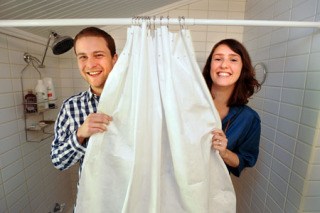For Chelsea Green and James Minola, life is meant to be forever green.
The island couple – Northwest products and East Coast college graduates – have come home to Bainbridge Island to fashion their sustainable passage through life.
Providence may have had something to do with Green, a 1998 BHS graduate, and Minola, a Mercer Island grad with Bainbridge parents, meeting at Rhode Island School of Design. Together, sharing like values and purpose, their future has promise.
The first step has been “Grain,” a consulting firm Minola founded to “unite sustainability and business through design.” Essentially, he said, “we help firms create green products and services for a green market.”
The idea is to learn about a firm’s product/services, research the market to identify target consumers and then create clear messages and values to those users. They are looking primarily for companies that produce enviro-friendly, sustainable products from materials that are community-based.
They realized from the beginning that establishing a consulting business would be slow, so they have started creating products that speak to their convictions and aspirations. They are well-matched creatively in that they are both industrial designers with strong consciences.
Their first success has been Ty, a recyclable, PVC-free shower curtain that is made from a simple No. 2-plastic product. It’s consumer-friendly in that it doesn’t have the nasty drawbacks of a vinyl curtain, including the chemical odor and its mold-growing propensity. The high-density polyethylene (HDPE) product is nontoxic, strong, easy to recycle, and made in the Northwest with U.S. materials.
Production is basic at this point, since they have “manufactured” all of the 50 curtains they have sold in their home on Wing Point Way. They buy a 200-yard roll – at a perfect width of five feet – from a local distributor, cut out a 72-inch-tall piece, punch out holes for rings and then package the product.
They sell for $23 on Grain’s website and $30 in a retail shop. The cost will go down, Green said, when the demand increases and they start mass-producing curtains. Bigger rolls of plastic will be cheaper, of course, though that would lead to production in a rental space and hiring employees.
“We are designers, not shower-curtain makers,” Minola said. “But we have had real positive interest, especially on the blogs.”
Green said they get their kicks from the creative part of the process, but they understand there’s a bridge between that and getting a product out into the world.
“Ideas are easy for us,” she said, “but the rest of it is really hard. The important part now is meeting the right people who are willing to work with us in a way that we can stay true to our sustainable beliefs.”
They have plans to partner their social values with good business by designing and making products their own way.
“Ours is an open-ended profession,” Minola said. “There are a lot of designers making interesting products, but not many are sustainable. Our focus is on contributing to society by caring about what we do.”


